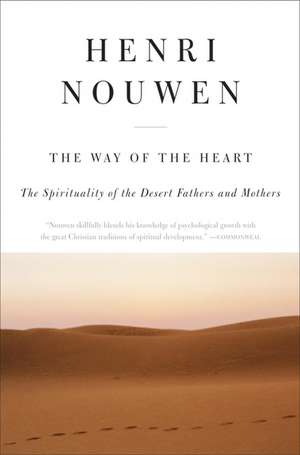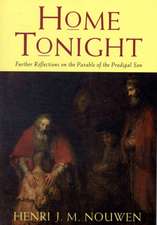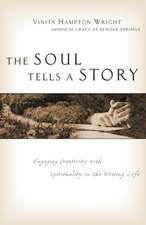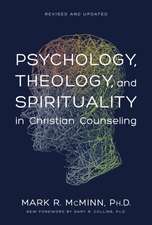The Way of the Heart: The Spirituality of the Desert Fathers and Mothers
Autor Henri J. M. Nouwenen Limba Engleză Paperback – 21 sep 2009
—Helen Prejean, C.S.J., author of Dead Man Walking
Henry J.M. Nowuen, one of the greatest of all spiritual writers, invites us to search deeply for the well-springs that nourish true ministry in his classic The Way of the Heart. Interweaving the solitude, silence, and prayer of the fifth-century Egyptian Desert Fathers and Mothers with our contemporary search for an authentic spirituality, The Way of the Heart not only leads us to a fuller encounter with God, but to a more creative ministry with our fellow human beings. Here is one of the most profound works from a writer known for his fresh and perceptive insights—and who stands alongside C.S. Lewis and Thomas Merton as an essential Christian scholar and thinker.
| Toate formatele și edițiile | Preț | Express |
|---|---|---|
| Paperback (2) | 79.34 lei 3-5 săpt. | +29.62 lei 7-11 zile |
| HarperCollins Publishers – 21 sep 2009 | 79.34 lei 3-5 săpt. | +29.62 lei 7-11 zile |
| BALLANTINE BOOKS – 30 noi 2003 | 86.42 lei 3-5 săpt. |
Preț: 79.34 lei
Nou
Puncte Express: 119
Preț estimativ în valută:
15.18€ • 16.49$ • 12.75£
15.18€ • 16.49$ • 12.75£
Carte disponibilă
Livrare economică 01-15 aprilie
Livrare express 18-22 martie pentru 39.61 lei
Preluare comenzi: 021 569.72.76
Specificații
ISBN-13: 9780060663308
ISBN-10: 0060663308
Pagini: 96
Dimensiuni: 135 x 203 x 5 mm
Greutate: 0.08 kg
Ediția:HarperCollins P.
Editura: HarperCollins Publishers
Colecția HarperOne
ISBN-10: 0060663308
Pagini: 96
Dimensiuni: 135 x 203 x 5 mm
Greutate: 0.08 kg
Ediția:HarperCollins P.
Editura: HarperCollins Publishers
Colecția HarperOne
Textul de pe ultima copertă
The modern classic that interweaves the solitude, silence, and prayer of the fourth- and fifth-century Egyptian Desert Fathers and Mothers with our contemporary search for an authentic spirituality
Recenzii
“Clear, precise, biblically founded guidance...Skillfully blends knowledge of psychological growth with the great Christian traditions.” — Commonweal
“Brings desert spirituality to bear upon the contemporary scene. ... Hauntingly relevant for us today.” — Christianity Today
“Gemlike in its clarity.” — The Christian Century
“Inspiring, to the point, and eminently practical in his advice about living spiritually in the world of today.” — Spiritual Book News
“On the long road it’s good to have Nouwen and his divining rod. Deftly he bends toward the drop of spiritual wisdom caked in the most ordinary things.” — Helen Prejean, C.S.J., author of Dead Man Walking
“Brings desert spirituality to bear upon the contemporary scene. ... Hauntingly relevant for us today.” — Christianity Today
“Gemlike in its clarity.” — The Christian Century
“Inspiring, to the point, and eminently practical in his advice about living spiritually in the world of today.” — Spiritual Book News
“On the long road it’s good to have Nouwen and his divining rod. Deftly he bends toward the drop of spiritual wisdom caked in the most ordinary things.” — Helen Prejean, C.S.J., author of Dead Man Walking
Notă biografică
Henri J.M. Nouwen was a world-renowned spiritual guide, counselor, and bestselling author of over forty books that many today consider spiritual classics. He taught at the universities of Harvard, Yale, and Notre Dame before becoming the senior pastor of L'Arche Daybreak in Toronto, Canada, a community where men and women with intellectual disabilities and their assistants create a home for one another.
Extras
The Compulsive Minister
Thomas Merton writes in the introduction to his The Wisdom of the Desert:
Society . . . was regarded [by the Desert Fathers] as a shipwreck from which each single individual man had to swim for his life . . . These were men who believed that to let oneself drift along, passively accepting the tenets and values of what they knew as society, was purely and simply a disaster.1
This observation leads us straight to the core of the problem. Our society is not a community radiant with the love of Christ, but a dangerous network of domination and manipulation in which we can easily get entangled and lose our soul. The basic question is whether we ministers of Jesus Christ have not already been so deeply molded by the seductive powers of our dark world that we have become blind to our own and other people’s fatal state and have lost the power and motivation to swim for our lives.
Just look for a moment at our daily routine. In general we are very busy people. We have many meetings to attend, many visits to make, many services to lead. Our calendars are filled with appointments, our days and weeks filled with engagements, and our years filled with plans and projects. There is seldom a period in which we do not know what to do, and we move through life in such a distracted way that we do not even take the time and rest to wonder if any of the things we think, say, or do are worth thinking, saying, or doing. We simply go along with the many “musts” and “oughts” that have been handed on to us, and we live with them as if they were authentic translations of the Gospel of our Lord. People must be motivated to come to church, youth must be entertained, money must be raised, and above all everyone must be happy. Moreover, we ought to be on good terms with the church and civil authorities; we ought to be liked or at least respected by a fair majority of our parishioners; we ought to move up in the ranks according to schedule; and we ought to have enough vacation and salary to live a comfortable life. Thus we are busy people just like all other busy people, rewarded with the rewards which are rewarded to busy people!
All this is simply to suggest how horrendously secular our ministerial lives tend to be. Why is this so? Why do we children of the light so easily become conspirators with the darkness? The answer is quite simple. Our identity, our sense of self, is at stake. Secularity is a way of being dependent on the responses of our milieu. The secular or false self is the self which is fabricated, as Thomas Merton says, by social compulsions. “Compulsive” is indeed the best adjective for the false self. It points to the need for ongoing and increasing affirmation. Who am I? I am the one who is liked, praised, admired, disliked, hated, or despised. Whether I am a pianist, a businessman, or a minister, what matters is how I am perceived by my world. If being busy is a good thing, then I must be busy. If having money is a sign of real freedom, then I must claim my money. If knowing many people proves my importance, I will have to make the necessary contacts. The compulsion manifests itself in the lurking fear of failing and the steady urge to prevent this by gathering more of the same–more work, more money, more friends.
These very compulsions are at the basis of the two main enemies of the spiritual life: anger and greed. They are the inner side of a secular life, the sour fruits of our worldly dependencies. What else is anger than the impulsive response to the experience of being deprived? When my sense of self depends on what others say of me, anger is a quite natural reaction to a critical word. And when my sense of self depends on what I can acquire, greed flares up when my desires are frustrated. Thus greed and anger are brother and sister of a false self fabricated by the social compulsions of an unredeemed world.
Anger in particular seems close to a professional vice in the contemporary ministry. Pastors are angry at their leaders for not leading and at their followers for not following. They are angry at those who do not come to church for not coming and angry at those who do come for coming without enthusiasm. They are angry at their families, who make them feel guilty, and angry at themselves for not being who they want to be. This is not an open, blatant, roaring anger, but an anger hidden behind the smooth word, the smiling face, and the polite handshake. It is a frozen anger, an anger which settles into a biting resentment and slowly paralyzes a generous heart. If there is anything that makes the ministry look grim and dull, it is this dark, insidious anger in the servants of Christ.
It is not so strange that Anthony and his fellow monks considered it a spiritual disaster to accept passively the tenets and values of their society. They had come to appreciate how hard it is not only for the individual Christian but also for the church itself to escape the seductive compulsions of the world. What was their response? They escaped from the sinking ship and swam for their lives. And the place of salvation is called desert, the place of solitude. Let us now see what this solitude did to them.
Thomas Merton writes in the introduction to his The Wisdom of the Desert:
Society . . . was regarded [by the Desert Fathers] as a shipwreck from which each single individual man had to swim for his life . . . These were men who believed that to let oneself drift along, passively accepting the tenets and values of what they knew as society, was purely and simply a disaster.1
This observation leads us straight to the core of the problem. Our society is not a community radiant with the love of Christ, but a dangerous network of domination and manipulation in which we can easily get entangled and lose our soul. The basic question is whether we ministers of Jesus Christ have not already been so deeply molded by the seductive powers of our dark world that we have become blind to our own and other people’s fatal state and have lost the power and motivation to swim for our lives.
Just look for a moment at our daily routine. In general we are very busy people. We have many meetings to attend, many visits to make, many services to lead. Our calendars are filled with appointments, our days and weeks filled with engagements, and our years filled with plans and projects. There is seldom a period in which we do not know what to do, and we move through life in such a distracted way that we do not even take the time and rest to wonder if any of the things we think, say, or do are worth thinking, saying, or doing. We simply go along with the many “musts” and “oughts” that have been handed on to us, and we live with them as if they were authentic translations of the Gospel of our Lord. People must be motivated to come to church, youth must be entertained, money must be raised, and above all everyone must be happy. Moreover, we ought to be on good terms with the church and civil authorities; we ought to be liked or at least respected by a fair majority of our parishioners; we ought to move up in the ranks according to schedule; and we ought to have enough vacation and salary to live a comfortable life. Thus we are busy people just like all other busy people, rewarded with the rewards which are rewarded to busy people!
All this is simply to suggest how horrendously secular our ministerial lives tend to be. Why is this so? Why do we children of the light so easily become conspirators with the darkness? The answer is quite simple. Our identity, our sense of self, is at stake. Secularity is a way of being dependent on the responses of our milieu. The secular or false self is the self which is fabricated, as Thomas Merton says, by social compulsions. “Compulsive” is indeed the best adjective for the false self. It points to the need for ongoing and increasing affirmation. Who am I? I am the one who is liked, praised, admired, disliked, hated, or despised. Whether I am a pianist, a businessman, or a minister, what matters is how I am perceived by my world. If being busy is a good thing, then I must be busy. If having money is a sign of real freedom, then I must claim my money. If knowing many people proves my importance, I will have to make the necessary contacts. The compulsion manifests itself in the lurking fear of failing and the steady urge to prevent this by gathering more of the same–more work, more money, more friends.
These very compulsions are at the basis of the two main enemies of the spiritual life: anger and greed. They are the inner side of a secular life, the sour fruits of our worldly dependencies. What else is anger than the impulsive response to the experience of being deprived? When my sense of self depends on what others say of me, anger is a quite natural reaction to a critical word. And when my sense of self depends on what I can acquire, greed flares up when my desires are frustrated. Thus greed and anger are brother and sister of a false self fabricated by the social compulsions of an unredeemed world.
Anger in particular seems close to a professional vice in the contemporary ministry. Pastors are angry at their leaders for not leading and at their followers for not following. They are angry at those who do not come to church for not coming and angry at those who do come for coming without enthusiasm. They are angry at their families, who make them feel guilty, and angry at themselves for not being who they want to be. This is not an open, blatant, roaring anger, but an anger hidden behind the smooth word, the smiling face, and the polite handshake. It is a frozen anger, an anger which settles into a biting resentment and slowly paralyzes a generous heart. If there is anything that makes the ministry look grim and dull, it is this dark, insidious anger in the servants of Christ.
It is not so strange that Anthony and his fellow monks considered it a spiritual disaster to accept passively the tenets and values of their society. They had come to appreciate how hard it is not only for the individual Christian but also for the church itself to escape the seductive compulsions of the world. What was their response? They escaped from the sinking ship and swam for their lives. And the place of salvation is called desert, the place of solitude. Let us now see what this solitude did to them.
Descriere
Descriere de la o altă ediție sau format:
Illuminating four spiritual disciplines, the distinguished theologian shares his inspiring wisdom in this handsome new gift-sized volume.
Illuminating four spiritual disciplines, the distinguished theologian shares his inspiring wisdom in this handsome new gift-sized volume.


















